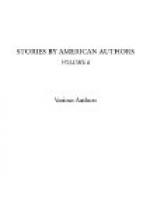Eph hesitated a moment, and then followed him.
“Mary, this is Ephraim Morse. We are going in to see the Dutch tiles I have told you of.”
She smiled as she held out her mittened hand to Eph, who took it awkwardly.
The square front room, which had been originally intended for a keeping-room, but had been Aunt Lois’s bedroom, looked out from two windows upon the road, and from two upon the rolling, tumbling bay, and the shining sea beyond. A tall clock, with a rocking ship above the face, ticked in the corner. The painted floor with bright rag-mats, the little table with a lacquer work-box, the stiff chairs, and the old-fashioned bedstead, the china ornaments upon the mantel-piece, the picture of “The Emeline G. in the Harbor of Canton,” were just as they had been when the patient invalid had lain there, looking from her pillow out to sea. In twelve rude tiles set around the open fireplace, the Hebrews were seen in twelve stages of their escape from Egypt. It would appear from this representation that they had not restricted their borrowings to the jewels of their oppressors, but had taken for the journey certain Dutch clothing of the fashion of the seventeenth century. The scenery, too, was much like that about Leyden.
“I think,” said the doctor’s wife, “that the painter was just a little absent-minded when he put in that beer-barrel. And a wharf, by the Red Sea!”
* * * * *
“I wish you would conclude to rig your boat with a new sail,” said the doctor, as he took up the reins, at parting. “There isn’t a boat here that’s kept clean, and I should like to hire yours once or twice a week in summer, if you keep her as neat as you do your house. Come in and see me some evening, and we’ll talk it over.”
Eph built his boat, and, in spite of his evident dislike of visitors, the inside finish and the arrangements of the little cabin were so ingenious and so novel that everybody had to pay him a visit.
True to his plan of being independent, he built in the side of the hill, near his barn, by a little gravelly pond, an ice-house, and, with the hardest labor, filled it, all by himself. With this supply, he would not have to go to the general wharf at Sandy Point to sell his fish, with the other men, but could pack and ship them himself. And he could do better, in this way, he thought, even after paying for teaming them to the cars.
The knowing ones laughed to see that, from asking no advice, he had miscalculated and laid in three times as much as he could use.
“Guess Eph cal’lates ter fish with two lines in each hand and ’nother in his teeth,” said Mr. Wing. “He’s plannin’ out for a great lay o’ fish.”




